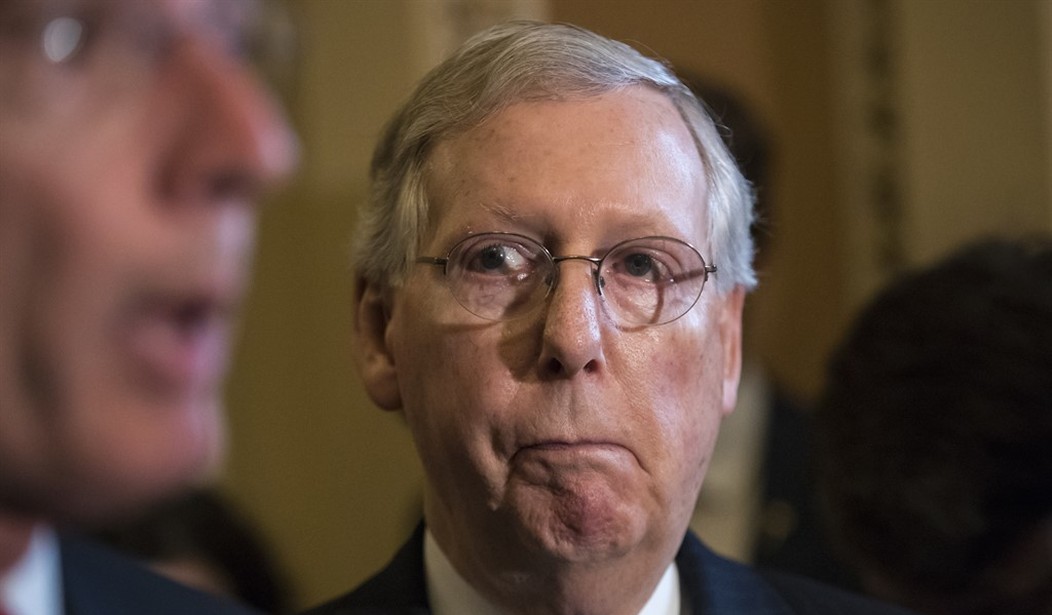Increasingly the GOP health-care saga feels like a season of Jets football: Depressing, way too long, utterly predictable in its outcome. We may be about to conduct an interesting experiment on what happens in a midterm if the ruling party passes … nothing. Nothing bad, nothing good either. Just nothing. Do voters vote their standard partisan preferences in that scenario or does a “do-nothing” Republican Congress get punished?
The only one of the three no’s who seems set in stone is Rand Paul. That’s the good news for McConnell. The bad news is that there are other potential no’s still out there — Dean Heller, Lisa Murkowski, Shelley Moore Capito, Mike Lee, Ron Johnson, Jeff Flake. Three no’s would put McConnell on the cusp of a nailbiting victory. Six or seven no’s and the game is all but over.
GOP ME Sen Collins says she's would "very likely vote no on the motion to proceed" unless CBO gives better numbers on Medicaid expansion
— Chad Pergram (@ChadPergram) July 13, 2017
Portman is a no on motion to proceed on revised Senate health care bill, says he's in the same position as he's been and reviewing language
— Alex Rogers (@arogDC) July 13, 2017
Mike Lee is undecided. Ted Cruz? He’s a yes — which was predictable, even though the version of the Cruz-Lee amendment that ends up in the bill may not be all that similar in key ways to the amendment he and Lee actually wrote. The difference in their current postures is obvious: Lee was reelected last year, Cruz is up for reelection next year. One can afford to be a thorn in Trump’s side, the other can’t. Until 2019, Cruz is Trump’s boy when he needs a key vote.
What about that CBO score on the new bill that Susan Collins is waiting for? Well, that’s a few weeks away — but the GOP has a back-up plan. What if, instead of waiting for CBO to project the fiscal damage from the bill, they … have Tom Price’s HHS department do some projections instead?
Why are Republicans looking elsewhere for a score? Because insiders expect the CBO score of Cruz’s proposal to take several weeks to complete, and the amendment language was only officially sent to CBO earlier this week.
The math just doesn’t work out, causing a dilemma for Majority Leader Mitch McConnell (R-Ky.), who hopes to vote on the Better Care Reconciliation Act next week.
The HHS score would speed up that timeline, but whether the score would comply with reconciliation rules, or if it would simply be symbolic — allowing Republicans to work around the parliamentarian to vote on a bill including the Cruz proposal without a CBO score — is uncertain.
CBO is a nonpartisan budgetary think think. A Republican-controlled HHS obviously isn’t nonpartisan. Peter Suderman compares using a score from the latter in lieu of the former to a team declaring a touchdown itself because the refs are taking too long. If McConnell uses an HHS score as an end-around the reconciliation rules, reconciliation as we know it may be dead. The next time Democrats control the government and want to pass something with 50 votes, they’ll farm their bill out to a friendly federal agency for budget projections instead of handing it to CBO and ram it through. Which makes this a gut check for Collins et al.: Will they insist that McConnell slow down and wait for CBO or will they play along with the HHS charade? In a way, it’s a replay of the filibuster debate. How hard do you want this game of procedural hardball to be in the name of advancing your agenda, knowing that the same tactics will be used against you in due time?
Exit question: If the bill collapses, what’s next? Before you say “clean repeal,” explain why moderates like Collins would agree to a clean-repeal bill that blows up the Medicaid expansion they’re so concerned about if they won’t vote for a new bill that merely scales it back? Right, right — they voted for clean repeal before when Obama was president. That’s because they knew Obama would veto it. Now they’re playing with real money. They won’t vote for it again. The only likely option is to pass a bipartisan bill shoring up the ObamaCare exchanges with new money for cost-sharing subsidies, etc. How many Republican votes will that get? Ten? Five? Three?
Update: Hmmmm. Portman’s comms guy says not to count him as leaning no just yet, at least on the motion to proceed.
This is correct. @senrobportman was a no on the previous bill & will review the text of new bill & CBO analysis before making any decisions https://t.co/IJP4arDL9V
— Kevin Smith (@KG_Smith) July 13, 2017








Join the conversation as a VIP Member